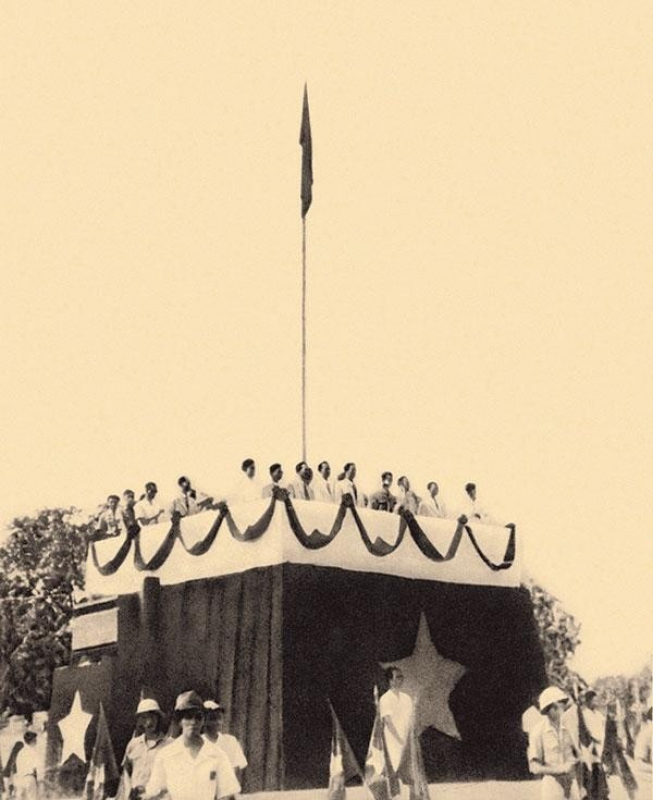President Ho Chi Minh's far-sighted vision in Declaration of Independence
In the Declaration of Independence proclaimed on September 2, 1945, at the Ba Dinh Square in Hanoi, President Ho Chi Minh raised extremely basic and correct issues relating to human rights in the nation in accordance with the common values of humanity, according to Professor, Dr. Mach Quang Thang, a Party history researcher.

In the Declaration of Independence, President Ho Chi Minh cited two important ideas from the US Declaration of Independence of 1776 and the Declaration of the Rights of Man and of the Citizen of the French Revolution of 1791, thereby showing his vision. His far-sightedness and foresight were aimed at preventing forces that were keen on making it difficult for the Vietnamese revolution in the future.
78 years ago amid the August Revolution, President Ho Chi Minh hastily drafted the Declaration of Independence, a document of the utmost importance as it affirmed the position of a new Vietnam, the basic values of human rights in the nation, along with self-determination of the Vietnamese people.
In the Declaration of Independence read by President Ho Chi Minh on behalf of the Provisional Government at Ba Dinh Square, he did not quote every sentence, every word, every period, every comma, but pointed out two important ideas in the US Declaration of Independence and the Declaration of the Rights of Man and of the Citizen of the French Revolution. He stated, “All men are created equal, that they are endowed by their Creator with certain unalienable Rights, that among these are Life, Liberty and the pursuit of Happiness.” However, he generalised this spirit to a higher level, noting, “All the peoples on the earth are equal from birth, all the peoples have a right to live, to be happy and free.” Accordingly, special importance was placed on the phrase, “All men…” which was duly upgraded to “all the peoples…”. This is a sensible change given the fact that once a country loses its independence, its citizens cannot have freedom and happiness; once a country is occupied by foreign aggressors, there is no guarantee that human rights can be enjoyed.
Therefore, independence served as the prerequisite for both ensuring and promoting human rights in any stages of our revolution. The cause of liberating the nation, constructing and safeguarding the country of Vietnamese people under the leadership of the Communist Party of Vietnam (CPV) was the dialectical combination of elements making unity, specifically liberating the nation, liberating society, class, and liberating human beings.
Under the glorious flag of the CPV, Vietnamese people stood up and fought against the colonialists, going on to gain independence, freedom, and human rights. As such, human rights in the nation were not endowed by somebody or came by chance but were the achievement of a long lasting and arduous struggle by the Vietnamese people.
Concluding the Declaration, Ho Chi Minh solemnly declared to the world that, “Vietnam has the right to be a free and independent country-and in fact is so already. And thus the entire Vietnamese people are determined to mobilize all their physical and mental strength, to sacrifice their lives and property in order to safeguard their independence and liberty.”
People living in an independent country must enjoy freedom, prosperity, and happiness. This is the living standard of the new regime mentioned by Ho Chi Minh, “If the country is independent but its people don’t have happiness and freedom, then the independence is meaningless.” Those values about human rights are immortal and since then the Vietnamese people have ceaselessly strived for human rights and have recorded numerous positive and significant achievements.
However, there are still some people who always misrepresent the human rights situation in Vietnam. According to the Professor, there are people who are hostile to the nation's political regime, whilst there are also people who betray the country because they are dissatisfied with the regime. Therefore, they choose to write and speak with a vicious attitude, changing white for black, denying the Party's leadership role or the merits of President Ho Chi Minh, as well as looking down on the revolutionary achievements of the country.
"In my opinion, the fact that these people have an out-of-touch tone distorting human rights issues in Vietnam is because of the following things. Firstly, they have impure minds, so they cannot see the bright side in solving human rights issues in Vietnam. They only see a dark picture of Vietnamese human rights.
Second, they don't want the current political system we're building. They want to change the political regime in our country, directing our country to a regime that is beneficial to them. And there have been many forces causing instability and riots. All with the goal of distorting and defaming the regime, wanting to steer our country away from the socialist path. Such is the nature of these voices,” Dr. Thang explained.
78 years have gone by, with the Declaration of Independence always enlightening the hearts and minds of Vietnamese patriot in every region of the country and abroad. The Declaration therefore extends a message of resolutely safeguarding independence, freedom, sovereignty, unity, and territorial integrity of the country. Only by doing this, along with reinforcing national unity under the leadership of the CPV, can human rights be ensured and be consistent with national independence associated with socialism is viewed as the foundation for the continuous progress of human rights.

